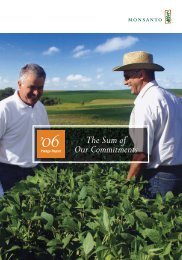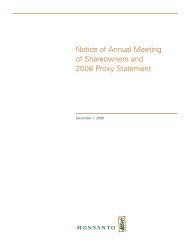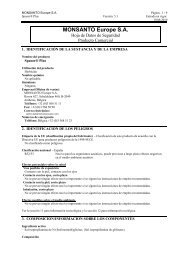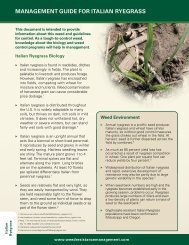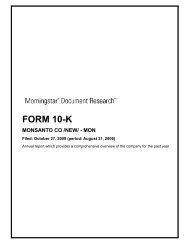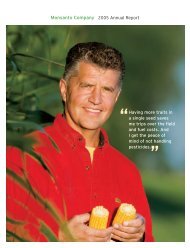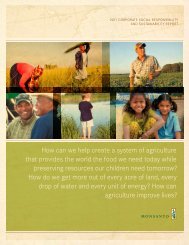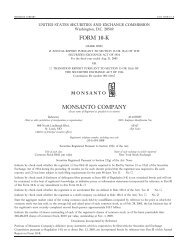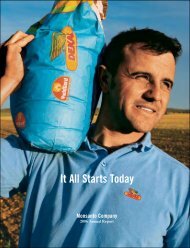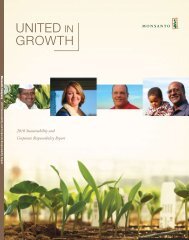You also want an ePaper? Increase the reach of your titles
YUMPU automatically turns print PDFs into web optimized ePapers that Google loves.
includes training in irrigation, reduced-tillage<br />
techniques, and business planning to generate<br />
income from surplus production. After six<br />
months, the families repay the loans by giving<br />
in-kind start-up supplies to other families in<br />
the community. Thus, the initial investment<br />
multiplies every six months, as 175 more<br />
families have access to in-kind loans.<br />
TRAINING FARMERS TO BECOME<br />
BUSINESSPEOPLE<br />
The Mpumalanga province of South Africa,<br />
suffers from an average unemployment rate<br />
of 45 percent. It has the second-lowest<br />
literacy rate in the country, despite close<br />
proximity to nearby centers of economic<br />
activity such as Johannesburg.<br />
The <strong>Monsanto</strong> Fund has provided a $135,000<br />
grant to an organization called TechnoServe<br />
for an agribusiness training program in the<br />
Moutse region of Mpumalanga area. The<br />
program provided basic business, credit management,<br />
and ag marketing training to 1,000<br />
entrepreneurial farmers and their families.<br />
Although the team ran into several challenges,<br />
such as harder topsoil and fewer experienced<br />
farmers than they expected, the participants<br />
showed great enthusiasm to improve their<br />
business and agricultural skills.<br />
<strong>Monsanto</strong> Pledge Award Winner<br />
Major Sustained Reduction<br />
in Glyphosate Intermediate<br />
Deepwell Waste Volumes<br />
Over the past three years, a determined team at the<br />
<strong>Monsanto</strong> Luling, Louisiana, <strong>Roundup</strong> herbicide manufacturing<br />
plant has achieved a major goal. The Glyphosate<br />
Intermediate (GI) Yield Team significantly reduced the<br />
volume of waste discharged to an onsite deepwell. Since<br />
2000, the team’s efforts have reduced the amount of<br />
deepwell waste by 65 million pounds, saved $7 million,<br />
and recovered 14 million pounds of usable GI product.<br />
The reduction in waste and cost savings occurred through<br />
improvements in two areas. The team was able to reduce<br />
the amount of GI crystals lost by improving centrifuge<br />
designs. It was able to minimize the amount of soluble<br />
GI in the batch process with statistical process controls.<br />
These two changes<br />
reduced the amount of<br />
GI sent out as waste by<br />
29 percent. Then, the<br />
team discovered that an<br />
adjustment to the batch<br />
recipe would cut costs<br />
and reduce hydrochloric<br />
acid waste by 25 percent.<br />
The efforts of the Luling team are the outcome of a<br />
persistent vision, focus, work, and the use of powerful<br />
improvement methods such as Six Sigma, a set of<br />
business and statistical tools that help people to understand,<br />
improve, and control any business process. The<br />
central idea behind Six Sigma is that if you can measure<br />
how many defects you have in a process, you can<br />
systematically figure out how to eliminate them and get<br />
as close to zero defects as possible. Each year, Luling<br />
will save an equivalent of 125 million pounds of deepwell<br />
waste and $5 million in raw materials costs.<br />
{ MONSANTO COMPANY 2004 PLEDGE REPORT: PAGES 46-47 }



